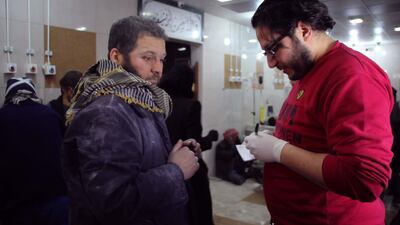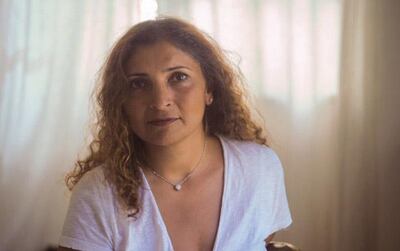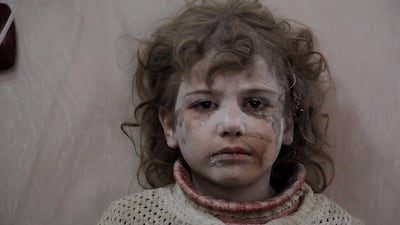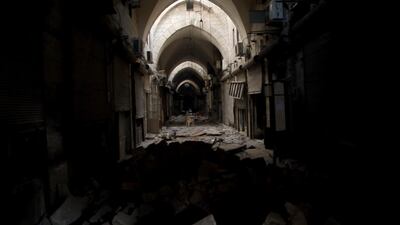A harrowing documentary, shot in East Aleppo in 2016 at the height of the siege of the city, gives a fascinating glimpse inside its last working medical facility, as bombs fall day and night.
Madness in Aleppo focuses in particular on the work of Dr Hamza Al Khatib (who was also in the award-winning documentary For Sama) and nurse Umm Ibrahim. They tirelessly continued to treat the wounded in the city's Al Quds Hospital right up until the very last civilians were evacuated from Aleppo before its eventual fall to Russian-backed government forces in December of 2016.
The film's director, Lina Sinjab, herself Syrian, was the BBC's correspondent in Syria from 2007-2013. In 2013, the Syrian government revoked her press accreditation and put her under a travel ban and house arrest. On escaping her home country, she continued to cover Syria from the BBC's London office before relocating to Beirut in 2015 to continue her work.
Directing from afar
Having witnessed first-hand the horrors taking place in her home country, I can't help, perhaps insensitively wonder what on Earth would convince her to return not only to Syria, but to the most dangerous place there.

East Aleppo in 2016 was a city with barely a remaining supply line, under constant attack from barrel bombs, cluster bombs and perhaps even chemical weapons. A commitment to great journalism is admirable – but there are obvious dangers to putting yourself on the frontline. It's understandable, then, that Sinjab didn't actually return to Aleppo herself, but handed the filming work to those already in the city while she did her best to direct from outside.
"I commissioned [noted Syrian photographer] Abd Alkader Habak to film it for me inside Aleppo and was directing on Skype and WhatsApp," she says. "I was asking him to do all these things, but it was hard to see what he was filming. He couldn't get footage out to me because of the poor internet and the constant bombing. I didn't get proper access to the material until I met him in Turkey in late 2017."

A whole new challenge
Sinjab is no stranger to having to direct events from outside an actual conflict zone – as a BBC correspondent she has frequently had to ask citizen journalists or cameramen on the ground to gather material for her.
But she says the challenge of obtaining footage for a two-minute clip on the nightly news is an entirely different one making a feature documentary: "We're trying to really get to know these people over an 80-minute film so you have to be really detailed about what you need. But even then, you're going to end up with what the cameraman can get because they're shooting it while they're being bombed."
In Turkey, where the material was handed over, the director found herself with hundreds of hours of footage she had never seen before. "It was really hard to stitch together all that footage because it's not really built in a proper documentary way," she says. "That's totally understandable because they're filming while barrel bombs are dropping around them, but it meant I had to spend about five or six months just going through all the footage, trying to stitch it together into at least the beginning of a structure."
Returning to the subject
Once that task was complete, Sinjab says the most important part of shooting what would become recognisable as a film took place outside of the war zone. "It was so important that I went back and visited the main characters again, where they had escaped to, and talk to them again. That's what really allowed me to stitch the whole thing together."
Unsurprisingly, the film is heavy on pain, chaos and disturbing images. But amid all the horror, when I saw the film, I couldn't help noticing one recurring image. Amid all the ruins, the injured children, the lack of food and medical supplies and the violence, the main characters always seem to have a cigarette in their mouth. I feel almost flippant when I raise this with Sinjab, but to my surprise, she admits she'd noticed the same thing. "That was one of the questions I always had in mind," she says. "They all laughed at me when I asked them because they felt the one treasure they had during the siege was cigarettes. I remember, this didn't make the film, but one of the questions I asked was 'when you first left and got out to safety, what was the first thing you wanted when you got out?' and they said 'a cigarette. All of us wanted a cigarette.'"
This observation became crucial to the naming of the film: "That was part of the reason for the title because all of this to me was complete madness. I couldn't live there, but these people were choosing to stay.
The madness is real
“In one of the final scenes, when they are leaving, you see a woman writing on a wall ‘the mad people of Aleppo pass through here’ and I thought ‘that’s it. This is where I have to name this and focus on the sheer madness.’”
Nurse Umm Ibrahim actually moved to Aleppo from her home in Turkey, abandoning her family and children to try to help out in the city of her birth. This revelation is one of the film's true jaw-dropping moments.
Sinjab says that although she certainly wouldn't be tempted to do the same, she can almost understand Ibrahim's decision. "I remember myself in 2011 to 2012 when I was still in Syria. I'd be in areas that were bombed and areas that were under siege, but I didn't want to leave. It is madness, but there's just no logic to attachment to your country."
Sinjab is in the process of submitting her film to festivals, and hopes to launch at a major international festival later in the year, so there'll be no public screenings just yet. In the meantime, she is also continuing her work for the BBC from her new base in Beirut, though she's at pains to point out that Madness in Aleppo is entirely separate from her work with the company.
"The BBC are very supportive of what I do privately, but this is a completely independent film, my first," she says. "If you look at the credits, you can see there are no big film institutes supporting me. The film was made in collaboration with Heinrich Boll and with support from Ayman and Sawsan Asfari - without them the film wouldn't have seen the light – but I'm really feeling my way around this world from scratch."
Despite the film's independence, however, there is at least one piece of BBC influence that Sinjab admits she has carried over to her documentary: "They may not be involved, but I hope I carry the ethics and credibility associated with BBC journalism into my own work, and into this film, too."


